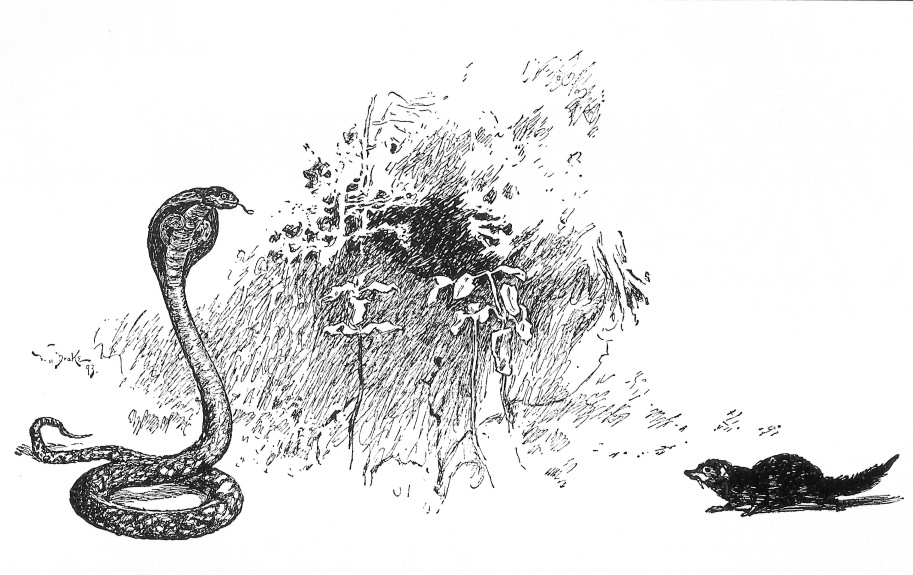Read the previous part here…
After a few more slokas, Keśava got up and walked up to the chief sanyasi, who was watching him intently. “I seek your blessings, o revered one”, he said as he fell at the sanyasi’s feet. “Please honor me by coming to my house first, when you set out to seek alms today.”

The sanyasi said “My son, you know what Dharma is. We are not Brahmins, to be invited to your house in this manner. When we need food, we approach an ardent devotee of Jina and beg for food. Even then, we have very little – just enough to sustain ourselves. We don’t need more than that. So please, we cannot accept your invitation.”
Keśava replied ” I am aware of your restrictions, o revered one. It is just that I have collected a lot of parchments that can be used for writing of the scriptures, and have saved enough money to offer it to those who will write on them as well. Hence the invitation. I will come again tomorrow.: He bowed, and then left.
At home, Keśava kept the sticks ready. He even tested them on the doors of his house, hitting the sticks against them and feeling the impact. Satisfied, he kept the sticks behind the main door, and slept.
The next day, Keśava set out to the ashram once again, and managed to reach just in time, as the sanyasis were setting out to seek alms. He beseeched them and somehow convinced them to go with him. The sanyasis too, in the greed of what was offered, ignored their usual devotees and set out with Keśava. It is well said…
एकाकी गृह-सन्त्यक्तः पाणि-पात्रो दिगम्बरः ।
सो ऽपि सम्बाध्यते लोके तृष्णया पश्य कौतुकम् ॥ १५ ॥
ekākī gṛha-santyaktaḥ pāṇi-pātro digambaraḥ |
so ‘pi sambādhyate loke tṛṣṇayā paśya kautukam || 15 ||
He lives in solitude, has renounced the world, holds a begging bowl, and wears no clothes…yet this sanyasi too is moved by the desire for things!
जीर्यन्ते जीर्यतः केशा दन्ता जीर्यन्ति जीर्यतः ।
चक्षुः श्रोत्रे च जीर्येते तृष्णैका तरुणायते ॥ १६ ॥
jīryante jīryataḥ keśā dantā jīryanti jīryataḥ |
cakṣuḥ śrotre ca jīryete tṛṣṇaikā taruṇāyate || 16 ||
As one becomes old, one’s hair becomes old (grey), teeth become old (they fall out), eyes and ears become old (one’s senses of seeing and hearing become weak). Only one’s desire remains young, it never grows old.
As they walked in through the gates, Keśava welcomed them with folded hands, and brought them inside. As the last sanyasi walked in, the barber bolted the door from inside, took out the two sticks and started to hit the poor sanyasis on their heads. They screamed, but he didn’t relent – mayabe two-three hits did the trick, he thought to himself.
Some neighbors heard the commotion and came to the rescue. A group of policemen, who were patrolling the area, also rushed to the scene. They saw the hapless sanyasis rushing out of Keśava’s house, screaming and bleeding profusely.
“What happened!”, asked the policemen. The sanyasis narrated their ordeal.
Keśava was arrested and brought to the court in chains. Some of the sanyasis too were present. The judge asked him “Tell us, why did you try to kill these holy men? What justification could you possibly have?”
Keśava replied “My lord, I saw a rich man named ManiBhadra, doing the same thing”, and he told the judge everything that he had seen happening at ManiBhadra’s house.
The judge sent for ManiBhadra, who came to the court with a worried look on his face.
“Did you hit a sanyasi?”, asked the judge.
ManiBhadra narrated his side of the story, in full detail.
The judge considered all aspects of the case before him, and ordered that the barber be sentenced to life in prison. The reason, he said, was that the barber acted without thinking of the dire consequences of his actions. He said…
कुदृष्टं कुपरिज्ञातं कुश्रुतं कुपरीक्षितम् ।
तन् नरेण न कर्तव्यं नापितेनात्र यत् कृतम् ॥ १ ॥
kudṛṣṭaṃ kuparijñātaṃ kuśrutaṃ kuparīkṣitam |
tan nareṇa na kartavyaṃ nāpitenātra yat kṛtam || 1 ||
One should not get into anything, without thinking of the consequences, without knowing all aspects of it, without proper analysis, and without practically testing it…not like that foolish barber.
And, it is well said…
अपरीक्ष्य न कर्तव्यं कर्तव्यं सुपरीक्षितम् ।
पश्चाद् भवति सन्तापो ब्राह्मणी नकुलं यथा ॥ १७ ॥
aparīkṣya na kartavyaṃ kartavyaṃ suparīkṣitam |
paścād bhavati santāpo brāhmaṇī nakulaṃ yathā || 17 ||
One should always think before acting, and never reach a conclusion without examining all the facts. Else, it would lead to a lot of regret, like in the case of the Brahmin lady and the mongoose.
ManiBhadra said “How did that happen?”
The judge replied…
to be continued…
